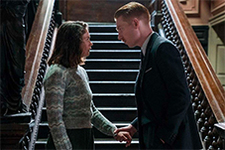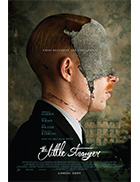The Little Stranger
|  The Little Stranger, Lenny Abrahamson’s follow-up to his widely acclaimed drama Room, could very well have been titled Rooms, as the majority of the story unfolds within the cavernous, largely abandoned, and deeply unsettling interior spaces of Hundreds Hall, a dilapidated 18th-century red-brick English manor standing alone in the heavily wooded region of Warwickshire. While only a few rooms in the manor are still in regular use, its former glory having faded over the decades since the turn of the 20th century and the gradual decline of the landed gentry in England (the story takes place in the early 1940s), there are constant reminders of the presence of dozens and dozens of interconnected rooms, standing forlorn behind closed doors, empty except for the lingering memories … and maybe, just maybe, a spiteful supernatural presence that is largely responsible for the torment being suffered by the remains of the once great Ayres family that resides there. The story is told through the eyes of a young, exceedingly proper doctor named Faraday (Domhnall Gleeson), whose mother worked as a maid at Hundreds Hall during its heyday. We learn early on that he attended a celebration at the manor in 1919, which we see in bright, florid flashbacks that we later discover are also laced with pain. Faraday is called to the manor one morning to attend to Betty (Liv Hill), the only maid who still works there, which brings him into contact with the house’s trio of occupants: Mrs. Ayers (Charlotte Rampling), the matriarch who still clutches at the family’s social prominence; her son Roderick (Will Poulter), an RAF pilot whose face and body (and possibly mind) have been twisted and disfigured by an airplane crash; and Caroline (Ruth Wilson), Roderick’s sister who has recently returned to the manor to help manage it. Faraday reveals little in his facial expressions and utterances, but it is still clear that he is fascinated by the Ayers and wants to be a part of their world, which is why he returns to the manor whenever there is an excuse, eventually ingratiating himself into their world and attempting to romance Caroline, who seems distant and miserable trying to hold the family together. And then there’s the presence, which Roderick at one point describes as “a thing in this house that hates us.” Eschewing the blunt force of jump scares and obvious visual monstrosities, Abrahamson instead relies on a subtly insidious tension that grows and develops over the course of the film. The emotional texture is woven with equal parts dread and sadness, fright and despair. Some will likely complain that it is too slow-moving and there isn’t nearly enough “horror,” but such complaints are based on expectations of quick and easy gratification, which The Little Stranger strategically denies. Given that there are lingering questions as to whether this is even a horror film at all—one could very well and rightly describe it as a drama about familial discord within the crumbling English class structure, and it works whether or not the “thing” is real or imagined—it is best to see The Little Stranger as an intensely felt slow-burn of desperation for things that are, if not completely gone, rapidly fading. Faraday, despite his slavishly controlled exterior (note how utterly, almost creepily well-groomed he is at all times), is desperate to be part of the world that so entranced him as an impressionable child—the familial heritage that Mrs. Ayers is so desperate to hold onto, Roderick is so desperate to manage, and Caroline is so desperate to escape from. Everything in the film revolves around the idea of the great family and what happens when that center is gone. Thus, the presence, which Mrs. Ayers is convinced is the angry ghost of her daughter who died at 8 years of age, is both a literal source of torment and a metaphor for the all the characters’ refusal to let go of the past. Visually, the film’s great achievement resides in Abrahamson and cinematographer Ole Bratt Birkeland’s powerful manipulation of space and off-screen space; the film has an eerily beautiful sense of decay in conveying the physical and emotional ravages of time and neglect, but it also keeps us constantly aware of what we’re not seeing—what is just off screen, behind a door, around a corner, up a dark flight of stairs, which generates a sustained sense of foreboding that is enhanced by Stephen Rennicks’s constantly shifting score. Like many great Gothic tales, among them Henry James’s The Turn of the Screw (1898) and Jack Clayton’s masterful 1961 film adaptation The Innocents, The Little Stranger plays with our expectations of a ghost story: Is the presence in Hundreds Hall an actual supernatural entity or just the tortured projections of a family in imminent decline, the embodiment of their decaying stature, collapsing power, and lost identity? Without giving too much away, I will suggest that the answer lies in the beholder, as Abrahamson and screenwriter Lucinda Coxon (The Danish Girl), working closely from Sarah Waters’s 2009 novel, leave the answers to the big questions fascinatingly ambiguous. The film’s final shot simultaneously answers everything and nothing, which some viewers are likely to find infuriating and others (myself included) will find deliciously challenging and thought-provoking. Copyright © 2018 James Kendrick Thoughts? E-mail James Kendrick All images copyright © Focus Features |
Overall Rating: 


 (3.5)
(3.5)


